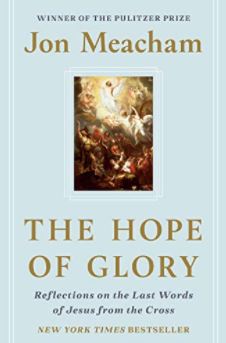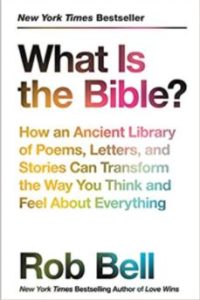“I am in no sense an evangelical, for I do not share the view that faith in Jesus is the only route to salvation, nor am I determined to convert others to my point of view,” writes author Jon Meacham in the opening of his book The Hope of Glory – Reflections on the Last Words of Jesus on the Cross. This immediately caught my eye – is it possible to be a Christian, value the words of Jesus, but not adhere to the extreme views of some evangelicals of today who think their interpretation of scripture is the only right way? That’s me, and that’s Jon Meacham.
“We are called to use our minds as well as our hearts in reading the Bible, deciding, through the use of reason, whether a given passage is an actual report or a theological device. The Bible was not FedEx’d from heaven, nor did the Lord God of Hosts send a PDF or a link to scripture,” Meacham says. “Written in Greek, and drawing on a Greek translation of originally Hebrew scriptures, the gospels tell stories in a language foreign to Jesus himself. We must engage with the texts of the faith with reason, a critical intelligence, and a capacity to distinguish history from legend, narrative from allegory, and fact from apologetics.”
I like that. I wanted to read more. Meacham goes on to analyze the last words of Jesus on the Cross and how those words impact him (and could impact us) in everyday life. Two of my favorites:
“Father, forgive them for they know not what they do,” said Jesus.
This verse to me shows the unconditional love of God as expressed through Jesus. Meacham writes, “The task of the evangelists—the task of Luke—was to bring as many souls into the fold as possible at a time when the Christian movements were tenuous and fragile. By reporting that Jesus himself had forgiven all those who might be blamed for his brutal death, Luke was making the faith more accessible and appealing than it might have otherwise been.”
Pilate said to Jesus, “What is truth?”
Pilate was in a quandary of what to do with Jesus. It was obvious to him the truth was that Jesus was unjustly charged. “I find in him no fault at all,” Pilate says. Yet when confronted with a truth he did not want to deal with, Pilate essentially said “no one really knows what truth is anyway.” Meacham writes, “In the Gospel of Matthew, the risen Jesus says, ‘Lo, I am with you always, even unto the end of the world.’ Is that promise, at last, an answer to Pilate’s query about truth? We know this much: In the shadow of the cross, hope—not certainty, and surely not fear—is the truth that endures despite all the pain and all the heartbreak and all the tears.”
I feel Pilate’s words have meaning in this contentious election year. We are subjected to some dubious claims by the candidates. Rather than pray “God please support my candidate against the evils of those against him”, I prefer the prayer “God, show me the truth about this man and his claims.” And if the answer is something I don’t like, do I say “what is truth?” like Pontius Pilate? No, my commitment as an independent voter is to the candidate who is the most truthful with a positive vision for the country.
The above is a sample of the reflections Meacham has on the last words of Jesus. Get the book to read more.




